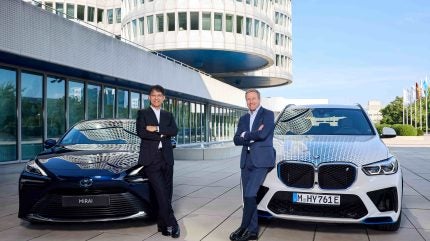
BMW plans to launch its first production fuel cell electric vehicle (FCEV) in 2028, offering customers an additional electric powertrain option, as the group and Toyota Motor extend collaboration to develop new powertrain technology.
“This is a milestone in automotive history: the first-ever series production fuel cell vehicle to be offered by a global premium manufacturer. Powered by hydrogen and driven by the spirit of our cooperation, it will underscore how technological progress is shaping future mobility,” said BMW chairman Oliver Zipse. “And it will herald an era of significant demand for fuel cell electric vehicles.”

Discover B2B Marketing That Performs
Combine business intelligence and editorial excellence to reach engaged professionals across 36 leading media platforms.
Koji Sato, president, Toyota Motor Corporation, added, “We are pleased that the collaboration between BMW and Toyota has entered a new stage.
“Based on these shared values, we will deepen our collaboration in efforts such as the joint development of next generation fuel cell systems and the expansion of infrastructure.”
The automakers will jointly develop the powertrain system for passenger vehicles, with the core fuel cell technology (individual third generation fuel cells) creating synergies for both commercial and passenger vehicle applications. The results will be used in individual BMW and Toyota models, expanding the range of FCEV options available.
Each maker’s FCEV models will maintain distinct brand identities and characteristics though synergies and amalgamating the total volume of powertrain units by collaborating on development and procurement promises to drive down the costs of the technology.
After successfully testing the iX5 Hydrogen pilot fleet worldwide, BMW is now preparing for series production in 2028 using the jointly developed next generation powertrain. It will offer existing model ranges with an additional hydrogen fuel cell drive system variants complementing BEV, PHEV and ICE versons.
BMW and Toyota have also collaborated on a sports car line.
“The pathway to realising the full potential of hydrogen mobility includes its use in commercial vehicles and the establishment of a refuelling infrastructure for all mobility applications, including hydrogen powered passenger vehicles,” they said.
“Recognising the complementary nature of these technologies, the BMW Group and the Toyota Motor Corporation are supporting the expansion of both hydrogen refuelling and battery electric vehicle charging infrastructure. Both companies are encouraging sustainable hydrogen supply by creating demand, working closely with companies that are building low-carbon hydrogen production, distribution, and refuelling facilities.”
The two automakers are advocating the creation of a conducive framework by governments and investors to facilitate the early stage penetration of hydrogen mobility and ensure its economic viability. By promoting the corresponding infrastructure, they aim to establish the FCEV market as an additional pillar alongside other powertrain technologies. They are also seeking regional or local projects to further drive the development of hydrogen infrastructure through collaborative initiatives.
“Hydrogen is the missing piece for completing the electric mobility puzzle where battery electric drive systems are not an optimal solution.”






